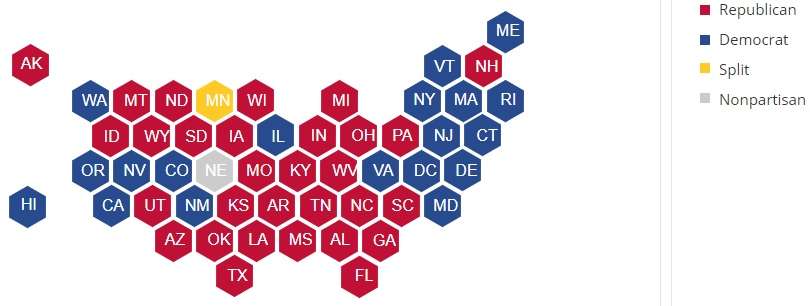The Volokh Conspiracy
Mostly law professors | Sometimes contrarian | Often libertarian | Always independent
State Election Results 2020
Nice summary from the National Conference of State Legislatures.

On average, 12 chambers change party in each general election cycle. This time? It's four—including 2019's shift for the Virginia House and Senate (from R to D) and this year's New Hampshire [shift from D to R in both houses]. That means over the two-year cycle, the parties came to a draw….
Going into the election, of the nation's 7,383 legislators, 3,820 (52%) were Republicans; 3,436 (47%) were Democrats, 82 (including all 49 senators in Nebraska) were either independents or from another party, and 45 seats were vacant. Democrats have not held a majority of seats in the nation's legislatures since the 2010 election, when Republicans took the lead.
[O]f the 98 chambers that have partisan control, 61 are held by Republicans, and 37 by Democrats. [The Nebraska Unicameral is officially nonpartisan, but is in practice majority Republican.-EV] …
Factoring governors in, far more state governments are divided than legislatures. The GOP gained control of all three power positions in two states this year: New Hampshire and Montana, where the new Republican governor replaced the outgoing Democratic governor. That gives the GOP 23 states, compared to the Democrats' control of 15 states. In 11 states, one power position is held by a different party than the other two. Eleven is the lowest split government control since 1952. In the 2000s, the number of splits was always 20 or higher.
In total, three-fourths of states have governors and legislatures of the same party, a sign that ticket-splitting may be waning nationwide….
When 2020 census data lands in state capitols next year it kicks off a year or more of redistricting. In most states, legislatures are the traditional seat of redistricting authority.
When legislatures redraw maps, the majority party controls the process, and in most states, the governor has veto power. Because redistricting is such a coveted responsibility, both parties cared more than ever about legislative outcomes this year. But—as said before—little changed and that means Republicans are in the catbird seat.


Show Comments (70)